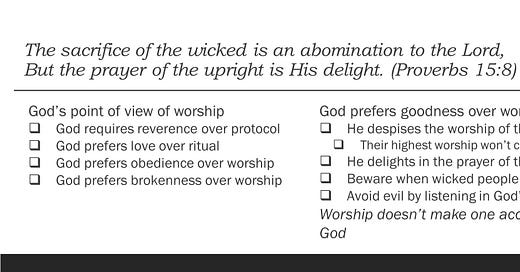When I was studying theories of worship, I ran into another line of reasoning to bolster the importance of worship. We can use worship as an evangelistic tool! How? People are more inclined to accept the gospel message after we invite them to worship with us.
Certainly, we should invite our unsaved and unchurched friends for times of worship, teaching & fellowship. Such opportunities teach them about our faith and dispels many false assumptions they may make (or the world pushes) about us. Christians may be different from non-believers, even odd, but never awful or evil. Ideally, they should sense our love for each other (John 13:34-35) rather than our taste in music.
We cannot transubstantiate (impressive word but I can rarely pronounce it right) worship into a magic talisman that transforms sinners into saints. That’s Jesus’ job through the Holy Spirit. The Bible tells us that He uses conviction rather than praise songs (1 Corinthians 14:24-25).
That reminds me of three verses from Proverbs. I don’t think the Bible is forbidding strangers from our gatherings (I strongly encourage public meetings with everyone welcome). These insights tell me a little about how God feels about random worship and a lot about how He feels about those who pretend to serve Him:
The sacrifice of the wicked is an abomination to the Lord,
But the prayer of the upright is His delight. (Proverbs 15:8, NASB)
We appreciate Hebrews poetry by contrasting the different lines (thoughts) of each verse. In the first example, the highest form of worship (sacrifice) is compared to a simple prayer. This emphasizes the obvious distinction between the wicked and the upright. These lines teach two lessons:
No degree or amount of worship can make the wicked person acceptable to God. It doesn’t matter how much they reach out to God. He rejects them entirely.
God delights in the smallest contact with the upright.
If you worry that the wicked person has no standing before God, remember the previous week’s lesson – repent for sins with contriteness and brokenness of heart. The verses from Proverbs do not exclude repentance, but they remind all people that godliness starts with internal repentance, not external religious activities.
The next two verses confirm this teaching with some new twists:
The Lord is far from the wicked,
But He hears the prayer of the righteous. (Proverbs 15:29, NASB)
And,
The sacrifice of the wicked is an abomination,
How much more when he brings it with evil intent! (Proverbs 21:27, NASB)
A wicked person might come before God with all the right words and actions. Famous and powerful people pretend piety for reputation. They use religion for their own purposes rather than to serve God.
The Bible reminds everyone that the wicked may fool us, but they never fool God. Not everyone who offers worship to God is His servant. Worship alone cannot change hearts because the unsaved cannot understand what is spiritually appraised (1 Corinthians 2:14).
Remain cautious of those who reference God’s name or reputation but don’t show signs of godliness. Sure it’s great when a movie star mentions a Christian theme, but I don’t get too excited anymore. I look for their long-term fruit (Matthew 7:15-20).
A final verse wraps up our study of worship from evil people:
Guard your steps as you go to the house of God and draw near to listen rather than to offer the sacrifice of fools; for they do not know they are doing evil.
(Ecclesiastes 5:1, NASB)
Fools practice evil throughout Psalms, Proverbs and Ecclesiastes. Nothing new here. We should notice that even a godly person can offer foolish worship when they fail to listen in God’s house.
Can’t use worship to make yourself acceptable to God. The best worship we can give begins with repentance, continues with goodness and ends with listening to God.




